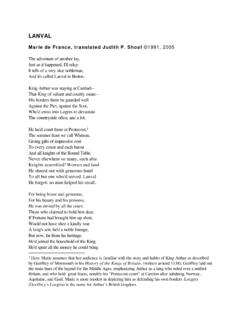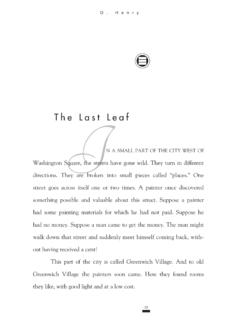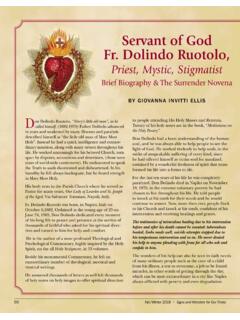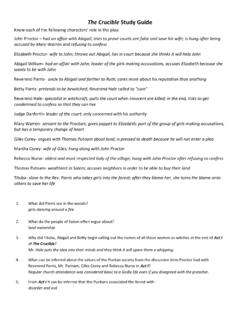Transcription of bisclavret - University of Florida
1 bisclavret Marie de France, translated Judith P. Shoaf 1996 Since I'm making lais, bisclavret Is one I don't want to forget. In Breton, " bisclavret "'s the name; "Garwolf" in Norman means the same. Long ago you heard the tale told-- And it used to happen, in days of old-- Quite a few men became garwolves, And set up housekeeping in the woods. A garwolf is a savage beast, While the fury's on it, at least: Eats men, wreaks evil, does no good, Living and roaming in the deep wood. Now I'll leave this topic I want to tell you about bisclavret . In Brittany there dwelt a lord; Wondrous praise of him I've heard: A handsome knight, an able man, He was, and acted like, a noble man.
2 His lord the King held him dear, And so did his neighbors far and near. He'd married a worthy woman, truly; Always she acted so beautifully. He loved her, she him: they loved each other. But one thing was a bother: Every week he was lost to her 1In the introduction, Marie juxtaposes, but distinguishes, the historical action recorded by songs (the activities of real werewolves) and the action of making the songs or stories. Compare the beginning of Equitan, which seems to be going to tell us how noble the deeds of the Bretons were, but ends up praising their lais rather than their actions.
3 In introducing bisclavret , Marie is, again, seriously teasing the reader: what terrible beasts these garwolves were! Cruel, wild who then can blame the wife in the story for not wanting to sleep with her husband? Yet Marie lightly dissociates the garwolf myth from her own tale ("now I will drop this matter, because I want to tell you the story of bisclavret "). As the story continues, the reader is forced to contrast the wife's rejection of her husband for his beastliness with the king's admiration of the same creature for his humanity. The horror the garwolf arouses in the introduction turns out to be irrelevant to this tale, in which the real horror is the woman who betrays the man she has loved.
4 For three whole days, she didn't know where, What became of him, what might befall Him; his people knew nothing at all. He came home to his house one day, So joyous he was, happy and gay; She began to ask him and inquire: "My lord," she said, "my friend, my dear, There's just one thing I might care To ask, if only I might dare-- But I'm afraid that you'll get angry, And, more than anything, that scares me." He hugged her when he heard all this, Drew her close and gave her a kiss. "My lady ," he said, "Ask me now! Anything you want to know, If I can, I'll tell you." "Sir, By my faith, you work my cure.
5 My lord, I'm in terror every day, Those days when you've gone away, My heart is so full of fear, I'm so afraid I'll lose you, dear-- If I don't get some help, some healing, I will die soon of what I'm feeling! Where do you go? Now you must say What life you live, where do you stay? You are in love--that's it, I know-- And you do wrong if this is so!" "My lady ," he said, "Please, God above! I'll suffer great harm if I tell you: I'll drive you off, right out of love, And lose my own self if I do." The lady heard how he refused. She was not the least amused. She brought it up again, and often She would flatter him and cozen Him to tell her his adventure-- Till, hiding nothing, he told her.
6 "My lady , I turn bisclavret ; I plunge into that great forest. In thick woods I like it best. I live on what prey I can get." When he'd told her all the story She asked, inquired one thing more: he Undressed?2 Or what did he wear? "My lady ," he said, "I go all bare." "Where are your clothes? Tell, for God's sake." "My lady , I won't say this, no; For if I lost them by this mistake, From that moment on, I'd know I'd stay a bisclavret forever; Nothing could help me, I'd never Change back till I got them again. That's why I don't want it known." "My lord," the lady replied, "It's true More than all the world I love you.
7 You should hide nothing from me, nor Ever doubt I'm loyal in any affair. That would not seem like true friendship. How have I ever sinned? What slip Makes me seem untrustworthy to you? Do what's right! Now tell me, do!" She nagged him thus, and thus harassed Him till he just had to tell, at last. "My lady ," he said, "near that wood, Where I come home, along that road, Standing there is an old chapel, Which often serves me well. The stone is there, hollow and wide, Beneath a bush, dug out inside; I put my clothes there under the bush Until I can come back to the house." The lady heard this marvel, this wonder.
8 In terror she blushed all bright red, Filled with fear by this adventure. Often and often passed through her head Plans to get right out, escape, for She didn't want ever to share his bed. 2 The verb "se despuille" is used ("undressed"); in lines 124, 268, and (as a rhyme word) 275, the noun "despuille" refers to bisclavret 's clothes (otherwise called "draps," linen). "Depouille" in modern French is a snake's sloughed skin, a trophy animal hide, or spoils, booty of war; a dead body is a "depouille mortelle." While the word always could refer to clothes, it certainly seems the ideal word to suggest clothes as both a unit, like skin itself, and clothes as the precious social identity that allows a man to be recognized as a man.
9 A knight in that country there Who long had loved the lady fair, Begging her so, praying hard, Giving generously to win her regard (She had never loved him before this, Nor let him think her love was his)-- She sent a messenger to bring Him to her, and told him everything. "My friend, my dear," she said, "be glad! You've been tormented, driven, sad Wanting what I'll give you today-- No-one will ever say you nay-- I grant you my love and my body, too: Take me, make me your lover, you!" He thanks her very gratefully. He takes her pledge made solemnly-- She swears an oath on the engagement. Then she told him how her lord went Away, and what he turned into.
10 The path he'd always taken to Enter the forest--this she shows; She sent him to get his clothes. Thus was bisclavret betrayed And by his own wife waylaid. Having lost him so often, indeed, Everyone generally agreed That he had finally left for good. He was looked for, inquiries pursued, But they couldn't find a trace. Finally they closed the case. The lady 's marriage was celebrated To the fellow who'd loved and waited. So, a whole year, matters rest, Until the King went hunting one day. He went straight to the forest Where the bisclavret used to stay. When the hounds were loosed and let Run, they found the bisclavret .












